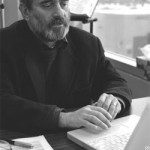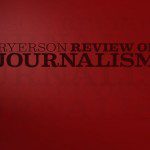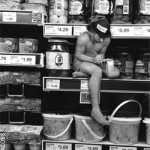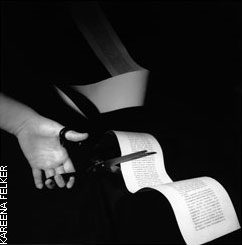Crossing the Line
There are many comments that writers can make in Arab2000. But should anti-Semitic remarks really be one of them?
Inside the Toronto offices of Arab2000, one of Canada’s leading Arab-language newspapers, discussions of current events are always taking place. Last fall, far from the Middle East’s most volatile zones, I spent several days speaking to the people responsible for directing the five-year-old community paper. Not surprisingly, suicide bombing was a dominant topic – it was around the time when Amar al-Far, a 16-year-old Palestinian from the Askar refugee camp (near the city of Nablus in the West Bank), detonated his explosives at the bustling Carmel market in Tel Aviv, killing himself and three Israelis. Equally unsurprising was that the paper’s three principals had different perspectives on the subject.
Kuwaiti-born Palestinian publisher Montaser Abdo held this view: “We’re all opposed to civilian casualties. Anyone who would kill a civilian, we don’t endorse it. Yet there’s an occupation, so resistance is a natural result.”
Iraqi-born editor May Elias was more sympathetic: “People can’t distinguish anymore between justified resistance, such as with Hamas and Hezbollah. They’re resistance groups – they’re not terrorist groups – and they’re defending their countries. Politics is forced upon you when you live in the Middle East. You don’t choose whether you’d like to think about suicide bombings if you’re living in Palestine, or about war if you’re living in Iraq. It’s all part of your daily reality. You wake up on it and you sleep on it.”
Syrian-born art director Mohamad Machlah was not: “Suicide bombings are a national tragedy for the Palestinians; they do nothing to advance the cause, and I just think there are other ways to resist.”
Such perspectives reminded me of the impassioned debates I would hear when I last visited the Gaza Strip 10 years ago. They would take place fil shawareh (in the streets), at the souks (markets), and, most notoriously, in coffeehouses, where men would smoke the argilah (water pipe), drink Arabic coffee, and discuss the latest political developments.
The difference in opinion among the Arab2000 trio is indicative of the diverging points of view about Israeli-Palestinian issues that Abdo, Elias, and Machlah want to showcase in their biweekly newspaper, which has a circulation of 8,000, with primarily Arab Canadian readers in Toronto, Hamilton, and London, Ontario. Publishing a diversity of opinions is a laudable goal among Canadians of Arab descent because there is so much dissatisfaction with how the mainstream media here cover the conflicts in the Middle East, and the Palestinian perspective in particular. As Abdo points out, “When [the mainstream media] show information about suicide bombings, they don’t present the causes and why people carry them out. These people are kids. A lot of them are 15, 16, and 17 years old. When you have people thinking about blowing themselves up, it’s totally wrong. I don’t endorse it, yet the Canadian media don’t give us the causes – the context. They just show that these people are extremists and terrorists.”
But if the people who run Arab2000 ever want to achieve their goal of being seen as a credible voice for Arab Canadians and gain some influence on the public discussion over Canadian policy toward the Middle East, they’ll have to put some boundaries on the debates they so badly want to encourage. The reason: to avoid a repeat of inflammatory diatribes such as those by California-based psychologist Elias Akleh, a regular commentator on the Israeli-Palestinian conflict for Arab2000. In an April 13, 2004 article titled “What’s Our Fault?” he refers to Israel as a “cancerous” and “parasitic” state. He also went on to ask, “Why do [Arab] governments change our curriculums to instill defeat into the national psyche of our youths under the disguise of peaceful coexistence, democracy, and acceptance of others – even our enemies? Our Islamic and Christian religions, unlike Judaism, have never rejected peaceful coexistence.”
Such intolerant remarks are antithetical to what Arab2000 wants to be. They’re also bad for corporate and government images. Throughout each edition of the paper are ads for such high-profile companies and government agencies as Re/Max, Sutton Real Estate, Western Union, Century 21 Real Estate, Toyota, Bally Total Fitness, the Job Track Centre (which is partly funded by the federal government), TD Canada Trust, Royal LePage, Petro-Canada, BMO Bank of Montreal, Ottawa’s Employment Insurance program, Maytag, Citizenship and Immigration Canada, and Omni.2 television.
But being in the same publication that has made the decision to publish anti-Semitic remarks is surely not the exposure they were looking for.
The day after my father’s family was expelled from their village in 1948, he travelled the 30 kilometres between Gaza and Hamama on foot to try to salvage any belongings left in his burnt village. The street names were still discernable, and he found his old house, along with some corn, wheat, and flour, which he took back with him in the still of the night. He travelled with much trepidation, as the roads were lined with land mines, and many family and friends had lost their lives to them.
He would go on to make 13 such night journeys, where he wandered around his village, unwilling to part with the loss of his land. On his eighth journey, the night was pitch black, and a group of people fired shots at him, narrowly missing. As well, they stole the donkey he had loaded goods on, so he ran back toward Gaza empty-handed.
Two days into the Six Day War of 1967, my mother and her six siblings decided to escape to her grandmother’s house, where they could take cover in her cellar. They stayed there for the remaining four days of the war and for three weeks afterwards, with little food and drink. They emerged from hiding to face a new reality: Israel had occupied the Gaza Strip and the West Bank, and Israeli soldiers were now fully visible in the streets, setting up command posts.
Even today, my extended family members’ stories haunt me. One I heard during my second trip to Gaza City, at age 15, in 1995. I was with my 13-year-old cousin, Hazem, and late one night, he told me he wished he were a bird so he could fly away and escape his life of confinement and restriction under military occupation. He said he longed to soar high into the sky and not be at anyone’s mercy to stop, as he is on the ground where Israeli soldiers restrict the free movement of Palestinians.
So it’s only natural that the majority of Arab Canadians have been politicized by what they’ve experienced and what they see happening in their homelands – where the Palestinians are still stateless; where a substantial number of countries have repressive regimes; where political debate is often stifled and the illusion of democracy persists with the name of only one candidate (usually the incumbent) appearing on ballots and where the populace marks a Na’am (yes) or La’a (no) on election day.
With all this background, it becomes clear why encouraging meaningful debate in the pages of Arab2000 has become a touchstone for Abdo and his colleagues. With such events as the second intifada, the Iraqi invasion, the death of Arafat, plus elections in both Iraq and in the Palestinian territories, the readers of Arab2000 have a deep hunger for informed commentary, which most feel they’re getting woefully little of from Canada’s established media outlets.
One reason why: few Canadian journalists know enough about the historical context of the region’s most volatile zones, the Arab people, and especially what many of us call the Palestinian narrative – the story of how my parents, along with approximately 750,000 others, lost their homeland. As the celebrated (and often controversial) Palestinian writer Edward Said wrote in 1979: “The fact of the matter is that today Palestine does not exist, except as a memory, or more importantly, as an idea, a political and human experience, and an act of sustained popular will.”
Another reason why: few Arab Canadian journalists are on the staffs of major media entities. The most high profile is Nahlah Ayed of the CBC. Her reportage is always engaging and thought-provoking. In April 2004, for instance, she succeeded in gaining access to Iraqi Shiite leader Muqtada al-Sadr before the United States issued an arrest warrant for him. What emerged was a candid exchange in which she asked Sadr to elaborate on his perception of American interests in the Middle East, as well as his thoughts on how Americans view freedom, which he likens to “moral destitution.”
Based in Beirut, Ayed, a Canadian of Palestinian descent, feels coverage of the Arab Middle East from this country’s major media outlets lacks depth and content. She’s hopeful she can challenge conventional wisdom and offer a unique perspective. “I am not on a personal crusade – far from that,” she says. “I just believe that perhaps, with my background, I may be able to have better access to Arab society here, and perhaps impart a little better knowledge and explanation of the complexities of the Middle East, and Arabs in particular.”
What she’s doing, adds Ayed, is “a little like a science graduate who decides to enter the media business to better explain scientific concepts and contribute to elevating scientific knowledge among ordinary people.”
Unlike Ayed, one Arab Canadian journalist with whom I spoke agreed to talk to me on the condition he remain anonymous. He works at a Canadian daily. His view on Middle Eastern coverage is that journalists in the mainstream media need to challenge themselves to unravel the complexities that Ayed refers to. “There’s this self-censorship that takes place with information coming from the region,” he says. “Journalists need to be proactive – to search for unconventional sources, such as information from research centres, and not rely on wire copy from CP or AP. It’s about treating such issues with a less presumptuous attitude. There’s this constant reference to ‘the Arab street,’ yet the Middle East is so diverse.”
The final reason why Arab Canadians aren’t getting informed commentary from mainstream media, suggests Ryerson University economics professor Ibrahim Hayani, is that media owners like the Aspers, who operate Canada’s largest chain of newspapers and one of Canada’s biggest broadcasters are perceived to allow “no room for criticism of Israel. They are very hostile towards Arabs and Muslims in that one can suspect they’re assuming that the Arabs are inherently prone to violence and inherently anti-democratic.” (Geoffrey Elliot, the vice president of corporate affairs of the Aspers’ CanWest Global Communications Corp., is quick to refute the claim: “It’s no secret the Asper family supports Israel, yet the reporting of the news is the news – we have no overt political agenda. Our editorial policy is one of accuracy and truthfulness. CanWest strives for a balance through the inclusion of opinion pieces that express a spectrum of opinions. If there’s a specific concern, it should be directed at the particular outlet.”)
Amir Hassanpour, an associate professor of Near and Middle Eastern civilizations at the University of Toronto, acknowledges why the Arab community gravitates toward community publications such as Arab2000. “News from the mainstream media is very concentrated and selective,” he says, “whereas community newspapers are very targeted.” In an October 2003 Toronto Star article titled, “A Chance to Lift the Veil of Ignorance About Arabs,” Omar Alghabra, the president of the Canadian Arab Federation wrote, “In a [January/February 2002] survey conducted by the CAF, 86 per cent of Canadian Arabs feel the Canadian media do not understand the Arab perspective. Discussions of Arabs, the Middle East and the Muslim world are rarely of cultural, historical or intellectual nature. They are almost always an occasion for controversy and condemnation.”
Asked this February if he sees any improvements, he responded: “On some levels, I do see improvements [in which] some media corporations [are] trying to be more sensitive and informed, but on many other levels I see the challenges becoming bigger.”
Such dissatisfaction, though, is good for Arab2000, just one of a number of alternative news sources that Arab Canadians are turning to. It’s a trend Mostafa Henaway, the projects coordinator of Al-Awda, the advocacy-oriented Palestine Right to Return Group, understands. “Often times, issues of importance, such as the Palestinian right to return to their homeland, are glossed over in the mainstream media,” he says. “There’s this assumption that Israel’s always existed. I spent six months in the Jenin refugee camp [in 2003], and I learned a lot about what life is like in a refugee camp, such as the widespread poverty and the desperation people feel. The media plays a big role with what and how issues are publicized. It’s no surprise that Arab Canadians are turning to other sources for a sense of affirmation.”
Henry Lowi, a Toronto lawyer and Jewish peace activist, agrees with this view. Seated in the boardroom of his spacious office, he recognizes what’s conspicuously absent in the mainstream media, despite the occasional background information that does show up. “There’s totally no context whatsoever. There’s never history. There’s never ‘what brought us to where we are now.’ All there is, is the bombs, the explosions, and the killings of today or yesterday. The newspapers are always referring to the refugee camps, they’re always referring to ‘the suicide bomber who went to the Carmel market, and came from Askar refugee camp.'”
“But what’s a refugee? Why is there a refugee? What’s life like in a camp? What kinds of lives do these people have? You never get any of that.”
* * *
Abdo chose the name Arab2000 because he wanted to encapsulate all the hype surrounding the millennium. As well, he felt the millennium was closely associated with all things progressive, and he felt it could mark a turning point for Arab Canadians in their struggles to integrate themselves in Canadian society, while reconnecting with their heritage. “I wanted to create a quality newspaper that was new and exciting, and where a balanced point of view is presented,” explains Abdo. “Although our lives are now in Canada, many of us remain extremely affected by what happens in the Middle East. Yet, admittedly, some have lost their sense of politics completely, and it’s my hope that this newspaper can reconnect them.”
For Abdo, creating Arab2000 has been the fulfillment of a dream. “I always wanted to get involved in the journalism profession. I wasn’t always sure in what capacity, yet I was determined.” However, Abdo admits it wasn’t always easy. “Initially, I had a hard time recruiting writers because I was unknown in the news media, yet the fact that I had established a name for my organization five years [earlier] really helped. I had a good base of clients and I started to approach them about advertising in the newspaper.”
Abdo is referring to his first publishing venture, the Arabic Business Pages, which he started to develop after completing a bachelor’s degree in economics and business at York University in 1993. A publication similar to the Yellow Pages, it’s currently a 200-page marketplace full of listings and ads for lawyers, real estate agents, restaurants, bakeries, community services, and much more.
With the business pages as a financial base, Abdo launched Arab2000. Today, the weekly competes against similarly sized community papers, like The Arab Star (7,000 to 8,000 copies biweekly) and Arab News (6,000 copies biweekly). To set itself apart, Arab2000 offers coverage of Canadian affairs (a series on the plight of Toronto’s homeless population, for instance) and emphasizes its unique international outlook.
“It’s about pushing boundaries on [Middle East] issues,” says editor Elias, “but we try to stay as neutral as possible. We don’t necessary agree with everything that’s written, but we expect readers to make up their own minds in reaching a conclusion with the perspectives we present.”
For example, in an article that appeared in the November 23, 2004 edition, Tariq Al-Maeena, a Saudi Arabia-based writer, painted a glowing portrait of Arafat’s legacy and likened the late Palestinian leader to two iconic Arab figures: Gamal Abdel Nasser of Egypt and King Faisal of Saudi Arabia. “This man embodied the spirit of collective resistance for almost 50 years,” stated Al-Maeena. However, he also criticized Arafat: “[He] was no saint. And neither was he a coward. And while he made mistakes, as any human would, he did not waver from the cause of his people.”
To cite another example of Arab2000’s efforts to combine pushing the envelope with neutrality: in the September 28, 2004 issue, Toronto-based Najwa Kewar Farah wrote about the desperate conditions experienced by Palestinian prisoners who had just completed a hunger strike protesting mistreatment by their Israeli captors. But she also wrote about how Israel had agreed to release 120 prisoners whose terms were almost complete. In addition, Kewar Farah also lambasted the Arab world for its lack of action toward Israel regarding the plight of Palestinian prisoners.
In that same issue was an exclusive interview with Khaled Mashal, a Hamas leader, by Egypt-based reporter Abdel Nasser Al-Daway. In the interview, Mashal implored the Arab world to involve itself in the Palestinian cause beyond symbolic gestures of support. He acknowledged the difference in approach to the conflict between Hamas, which doesn’t recognize Israel’s existence, and the Fatah faction, which is secular in its ideology and advocates the creation of an independent Palestinian state, with East Jerusalem as its capital, in the occupied territories.
Arab2000 also attempts to represent the lives of all Arabs, despite its emphasis on the region’s most volatile conflict zones. Machlah, the art director, is especially conscious of this when he’s laying out the pages. For example, as he was designing the October 12, 2004 edition, Machlah noticed a lack of coverage allotted to issues other than those pertaining to Palestine and Iraq. As a result, he pressed for the inclusion of a story on Saudi Arabia’s municipal elections. In addition, the paper updates international news three times a day on its website.
In his diatribe, Akleh lambastes the Arab world for its incompetence and utter indifference to the plight of the Palestinians, then expresses his resentment at Israel’s existence in the midst of Arab land, and proceeds to say that the God of the Jews is prejudiced. The latter part of this statement is not the only example of intolerant depictions of the Jewish people in Arab2000. In an October 4, 2004 article, which appeared on the website, titled, Continued on page 87/ Terror,” Akleh details his criticism of one aspect of the Jewish faith: “This racist religious ideology of ‘God’s chosen people’ was engraved into the Jewish psyche and had mutilated Jewish faith for almost two thousand years.”
By printing such poison, Arab2000 casts itself in an unfavourable light, which is unfortunate because it has the potential to be at the forefront of change. In noting what’s absent from the mainstream media, it can create and possibly sustain a forum of debate on how the Israeli Palestinian conflict is covered. Yet to succeed in this venture, the contents of Arab2000 will have to be scrutinized more carefully, particularly if the paper follows through on an expressed desire to expand its small English-language section, a move Tarek Fatah, the host of the television program The Muslim Chronicle and a founding member of the Muslim Canadian Congress, insists is essential if Arab2000 is to have a serious impact on journalism in Canada. “Al-Jazeera only came out in Arabic at one point,” he says. “A great interest developed in its content, and now it’s accessible in English via the Internet. Its coverage has certainly gained momentum, and now its impact has penetrated all parts of the globe. This,” he adds, pointing to a copy of Arab2000 with a dismissive glance, “is useless unless it comes out in English.”
Ultimately, a journalistically respectable Arab community paper should have some influence in the shaping of Canadian foreign policy in the Middle East, which according to John Ibbitson in The Globe and Mail last December, is now, thanks to “intense pressure” on Prime Minister Paul Martin, “more overtly pro-Israel.”
Four months after he uttered those words, I interview Abdo again. I ask him why he would publish such hatred from Akleh. His response: “I actually had a talk with him about his writing. I’m aware that some of the things he’s written in the past are over the limit, so he’s been made aware of the issue.”
Then I ask him if he’s ever thought of what might happen to the paper’s prosperity if companies like Re/Max and Clarica, both of which promote cultural diversity, pulled out because they were concerned about appearing in the same pages as hateful, intolerant representations of the Jewish people.
His response: “It’s never been an issue. A lot of the feedback we receive is positive, even about Akleh. We strive for balance, and I think we’ve made progress since my talk with him. Yet it’s an ongoing struggle, and we still need to work hard on it.”











































